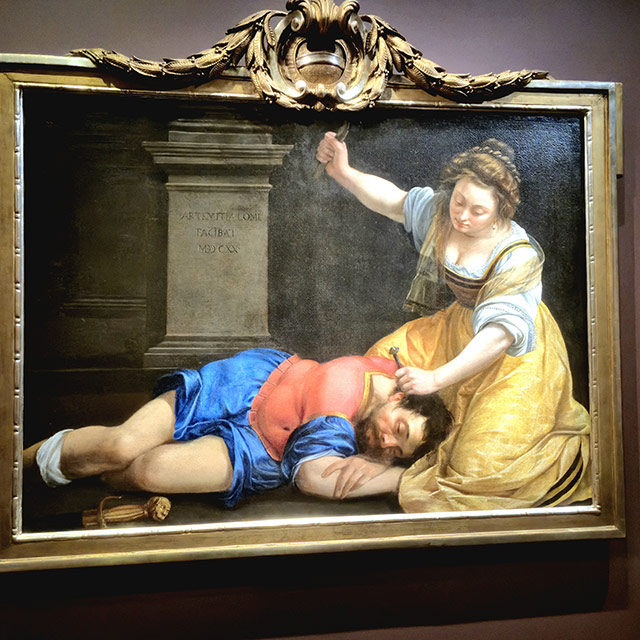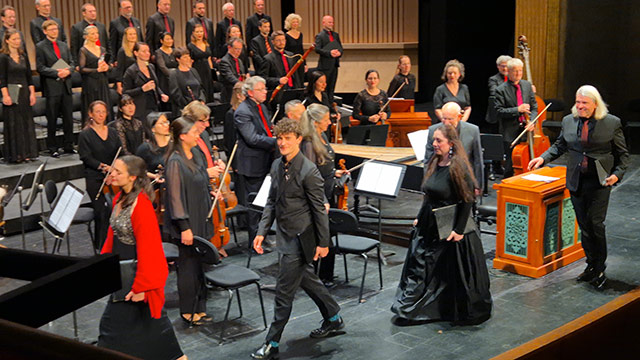Deborah, Haendel
Le 23 mai 2025 au Théâtre des Champs Élysées

 On this Friday in May, we had the pleasure of attending the TCE's rare performance of Deborah, the oratorio with which Handel responded in 1733 to the London public's desire for a work in English, which had been sorely missed since Purcell's death. He had been urged to free himself from “Italian servitude” and prove that English was suitable for opera. After the enthusiastic reception of Esther, the first of its kind, he decided to do so after a painful season of failures and opposition, financial losses, and the abandonment of friends and singers. It is said that he wrote Deborah very quickly, reusing many previous compositions in certain movements. For the libretto, he and Samuel Humphreys chose an episode from the Bible which, like Esther, celebrated the victory of a woman over the enemy of Israel. The very large number of voices and instruments in this work caused some surprise, some found it noisy, but ultimately the birth of this oratorio was to be followed by many others, and several masterpieces, of which Messiah is the most famous. A little forgotten afterwards, Deborah has now been revived by Ton Koopman, who has brilliantly brought it back to life.
On this Friday in May, we had the pleasure of attending the TCE's rare performance of Deborah, the oratorio with which Handel responded in 1733 to the London public's desire for a work in English, which had been sorely missed since Purcell's death. He had been urged to free himself from “Italian servitude” and prove that English was suitable for opera. After the enthusiastic reception of Esther, the first of its kind, he decided to do so after a painful season of failures and opposition, financial losses, and the abandonment of friends and singers. It is said that he wrote Deborah very quickly, reusing many previous compositions in certain movements. For the libretto, he and Samuel Humphreys chose an episode from the Bible which, like Esther, celebrated the victory of a woman over the enemy of Israel. The very large number of voices and instruments in this work caused some surprise, some found it noisy, but ultimately the birth of this oratorio was to be followed by many others, and several masterpieces, of which Messiah is the most famous. A little forgotten afterwards, Deborah has now been revived by Ton Koopman, who has brilliantly brought it back to life.
In the biblical text, the only judge and prophetess of Israel calls on Barak, a young and inexperienced military leader, to raise an army against the Canaanites who are enslaving her people. Deborah reminds him of the command given by the God of Israel and tells him to march: “Go, go up to Mount Tabor and take ten thousand men with you.” Curiously, he replies, “If you go with me, I will go. But if you do not go with me, I will not go.” She concludes that she will go, adding, “But in the expedition you are going on, glory will not be yours, for it is in the hands of a woman that Yahweh will deliver Sisera.” This text has prompted some comments accusing Barak of a lack of courage, mocking his desire to be led by a woman and to give her the glory. We recognize here the stakes of a debate that is still relevant today, where such a vision, still present after half a century of women's progress, continues to exclude the possibility that a man's glory can come through an alliance with a woman.
Handel and his librettist never attribute a lack of courage to Barak's words, but simply a moment of hesitation, followed by a desire to follow this woman who speaks in the name of God. Barak also feels joy that glory is going to a woman, demanding the same glory for women as for men. “O Deborah, may claim, Equal prerogative with man in fame; And none, but savage breasts alone, That charming merit can disown.” “O Deborah, the fair sex can claim an equal prerogative to glory with men; and no one, except barbarous hearts, can deny this pleasing honor” (Act I).
Here we see a remarkable Handelian position on gender relations, with a simplicity and intelligence worthy of the Just Men, attributing particular effectiveness to an army that combines the vision of this woman with the wise courage of this man. After the grand orchestration of the multi-statement overture and the ample chorus of the Israelites calling on God to give them a leader, which establish the majesty of the work from the outset, Deborah called on this favorite of heaven, this son of Abinoam, to rise. Barak, surprised at being chosen, asked: “Where do thy ardours raise me?” “How far does your enthusiasm raise me?” (Act I), but she urged him to trust in the God who inspires him and to act as he is inspired. The battle is thus led by Barak and his army, who are victorious thanks to Yahweh.
We are immediately immersed in this grand orchestral ensemble with its highly detailed orchestration, double choir, large string section, brass instruments, and moments of maximum intensity. It was a revelation for 18th-century audiences, and it remains so today. The blissful din of so many voices forming one to become the voice of an entire people fills us with an emotion that is instantly recognizable, in the encounter with a harmonious and benevolent violence that we welcome with gratitude.
The beautiful Amsterdam Baroque Orchestra and Choir, founded and long conducted by Ton Koopman, exudes a love for the Baroque in all its forms, particularly the oratorio, which allows singers to engage serenely with a large operatic ensemble and ambitious music, without the huge amount of staging required by opera. Ton Koopman regularly focuses on works or composers whose excellence is too little recognized, such as Buxtehude, whose wonderful Passion was recently performed at Notre Dame, and he brings back to life this oratorio, which has gone a little bit unnoticed in modern times among Handel's masterpieces. He leads his ensemble with remarkable precision and efficiency, and we witness the craftsmanship of his hands in the call of each section of the orchestra, in each movement towards each point of the orchestra and the choirs, like a loom raising threads from all sides, then moving from one of his harpsichords to another with their luminous sounds.
The cast is probably on a par with that of Handel's premiere, which brought together Anna Strada, the faithful soprano who incarnated the prophetess of Israel, and Senesino, the angry and sometimes deserting castrato, in the role of her lieutenant. Sophie Junker, who has already shared the Handel stage with Jakub Jozef Orlinski in Serse produced in Rouen in 2023, has successfully recorded La Francesina, pieces created by Handel at the end of his life for Élisabeth Duparc, and has also performed Barbara Strozzi's sacred song.
With her crystal-clear voice, which we already loved in St John Passion, she effortlessly, accurately and clearly portrays Deborah – whose name in Hebrew means bee – who leads the army to the liberation of her people. Jakub Jozef Orlinski, incarnating Barak, whose name means lightning, has just returned from participating in a dazzling Stabat Mater at St. Peter's Cathedral in Geneva, with Barbara Hannigan in an extraordinary production by Romeo Castelluci. He brings to this role the enthusiasm and freshness, the quality and assurance that it demands.
Their duet in the first act immediately transports us into the precious alchemy that Handel weaves with the intertwining of these two voices. Each of them goes on to perform sublime arias, some of which elicit irresistible applause, such as his in the first act in “All danger disdaining, For battle I glow; Thy glory maintaining, I'll rush on the foe”. (Act I). Here we see how Jakub Orlinski's voice continues to mature luminously, becoming even more powerful and brilliant, with the same clarity in the high notes and solidity in the low notes, a unique timbre of presence and sound, and still that singing line with almost no vibrato, except for the slight one that concludes the lifelong notes. Sophie Junker's voice takes on deep and welcome warlike accents, very sure in the ardor of her singing, for example in the second act, with the “Go frown, barbarian, Where thou art fear'd: None but our God is here rever'd;” “Go show your anger, Barbarian, Where you are feared; Here alone our God is honored” (Act II).
The rest of the cast is excellent, with the unexpected mezzo-soprano Sophia Patsi incarnating the enemy Sisera, bringing to the role the roundness and firmness of her voice, and the bass-baritone Wolf Matthias Freidrich, incarnating with strength and a voice that is a little bit too choppy, Abinoam, Barak's loving and proud father. Finally, Amelia Berridge, with her luminous soprano, takes on the role of Jael, the young heroine considered almost divine, who, in Act III, explains fiercely how, after giving milk to the enemy, she stabbed him in the temple while he slept, driving the stake through his head and into the ground. “I through his bursting temples forc'd the wound, And rivetted the tyrant to the ground.” “I pierced his temple with the stake, which nailed the tyrant to the ground.” (Act III) Such violence and determination, almost jubilant, make this unprecedented act an example of heroic virtue that delights Barak, the wise warrior. In 1620, Artemisia Gentileschi painted this scene remarkably, showing an almost tranquil heroine, intent on her bloody work without flinching.
The voices of the high priests are excellent, as are those of the Israelites and Baal, the multiple deity of fertility and storms, of the golden calf and phallic cults, whom Yahweh was to defeat.
Added to all this are the wonderful choruses, the voices of Canaan and the voices of Judah, which clash and respond to each other. At first a sum of voices that are a little bit uniform, the chorus becomes more complex, with occasional jerky movements incarnating threat or anger. It is an integral part of the sacred drama that is being played out, and it grips us in its vast music, like the ancient Greek chorus dialoguing as part of the hero.
